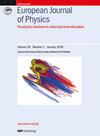为期一天的活动能否激发大学对量子物理学的兴趣?
IF 0.8
4区 教育学
Q4 EDUCATION, SCIENTIFIC DISCIPLINES
引用次数: 0
摘要
正在进行的第二次量子革命以及量子技术对社会和经济日益增长的影响使量子物理教育变得更加重要。因此,针对大学生甚至普通大众的量子物理教育研究层出不穷。然而,学习量子物理或任何其他主题都是自愿的,因此是个人兴趣问题,而且只能从早期播下的种子开始成长。在这里,我们描述并检验了芬兰图尔库大学为激发物理和数学系学生对量子物理的兴趣并改变他们对量子物理的看法而设计的为期一天的活动是如何成功实现其目标的。我们通过问卷调查和补充访谈收集了参与者的数据。我们发现,这次活动使人们对量子物理的态度和看法更加积极、多变和现实。虽然活动时间太短,无法显著或持久地提升参与者的兴趣,但根据四级量表的外部评估,大多数参与者的自我评估仍然表明他们的兴趣有所提高。由此看来,即使是一次短暂的活动,也能为进一步保持和发展兴趣提供肥沃的土壤,例如,通过精心设计和适时安排量子物理课程。本文章由计算机程序翻译,如有差异,请以英文原文为准。
Can a one-day event trigger interest in quantum physics at the university level?
The ongoing second quantum revolution and the growing impact of quantum technologies on our society and economy are making quantum physics education even more important. Consequently, there is a lot of research on quantum physics education for university students and even the general public. However, studying quantum physics or any other topic is primarily voluntary and thus a matter of personal interest—and it can only grow from a seed planted earlier. Here, we describe and test how a one-day event designed to trigger interest and change perceptions about quantum physics among physics and mathematics students at the University of Turku, Finland succeeded in meeting its goals. The data was collected from participants through questionnaires and complementary interviews. We found that the event made attitudes and views toward quantum physics more positive, versatile, and realistic. Although the event was too short to notably or permanently elevate the phase of interest when evaluated externally on a four-level scale, self-evaluations still reported an increased interest for most participants. Thus, it appears that even a short event can cultivate the ground to make it fertile for maintaining and developing interest further, for example, by well-designed and -timed quantum physics curriculum.
求助全文
通过发布文献求助,成功后即可免费获取论文全文。
去求助
来源期刊

European Journal of Physics
物理-物理:综合
CiteScore
1.70
自引率
28.60%
发文量
128
审稿时长
3-8 weeks
期刊介绍:
European Journal of Physics is a journal of the European Physical Society and its primary mission is to assist in maintaining and improving the standard of taught physics in universities and other institutes of higher education.
Authors submitting articles must indicate the usefulness of their material to physics education and make clear the level of readership (undergraduate or graduate) for which the article is intended. Submissions that omit this information or which, in the publisher''s opinion, do not contribute to the above mission will not be considered for publication.
To this end, we welcome articles that provide original insights and aim to enhance learning in one or more areas of physics. They should normally include at least one of the following:
Explanations of how contemporary research can inform the understanding of physics at university level: for example, a survey of a research field at a level accessible to students, explaining how it illustrates some general principles.
Original insights into the derivation of results. These should be of some general interest, consisting of more than corrections to textbooks.
Descriptions of novel laboratory exercises illustrating new techniques of general interest. Those based on relatively inexpensive equipment are especially welcome.
Articles of a scholarly or reflective nature that are aimed to be of interest to, and at a level appropriate for, physics students or recent graduates.
Descriptions of successful and original student projects, experimental, theoretical or computational.
Discussions of the history, philosophy and epistemology of physics, at a level accessible to physics students and teachers.
Reports of new developments in physics curricula and the techniques for teaching physics.
Physics Education Research reports: articles that provide original experimental and/or theoretical research contributions that directly relate to the teaching and learning of university-level physics.
 求助内容:
求助内容: 应助结果提醒方式:
应助结果提醒方式:


